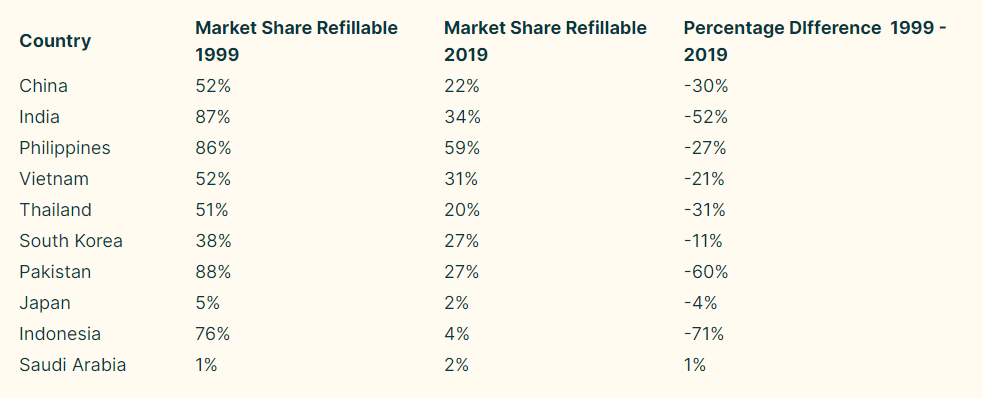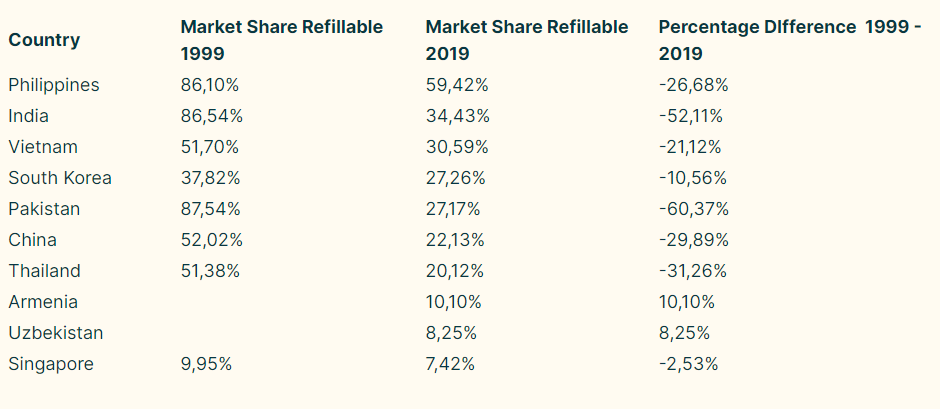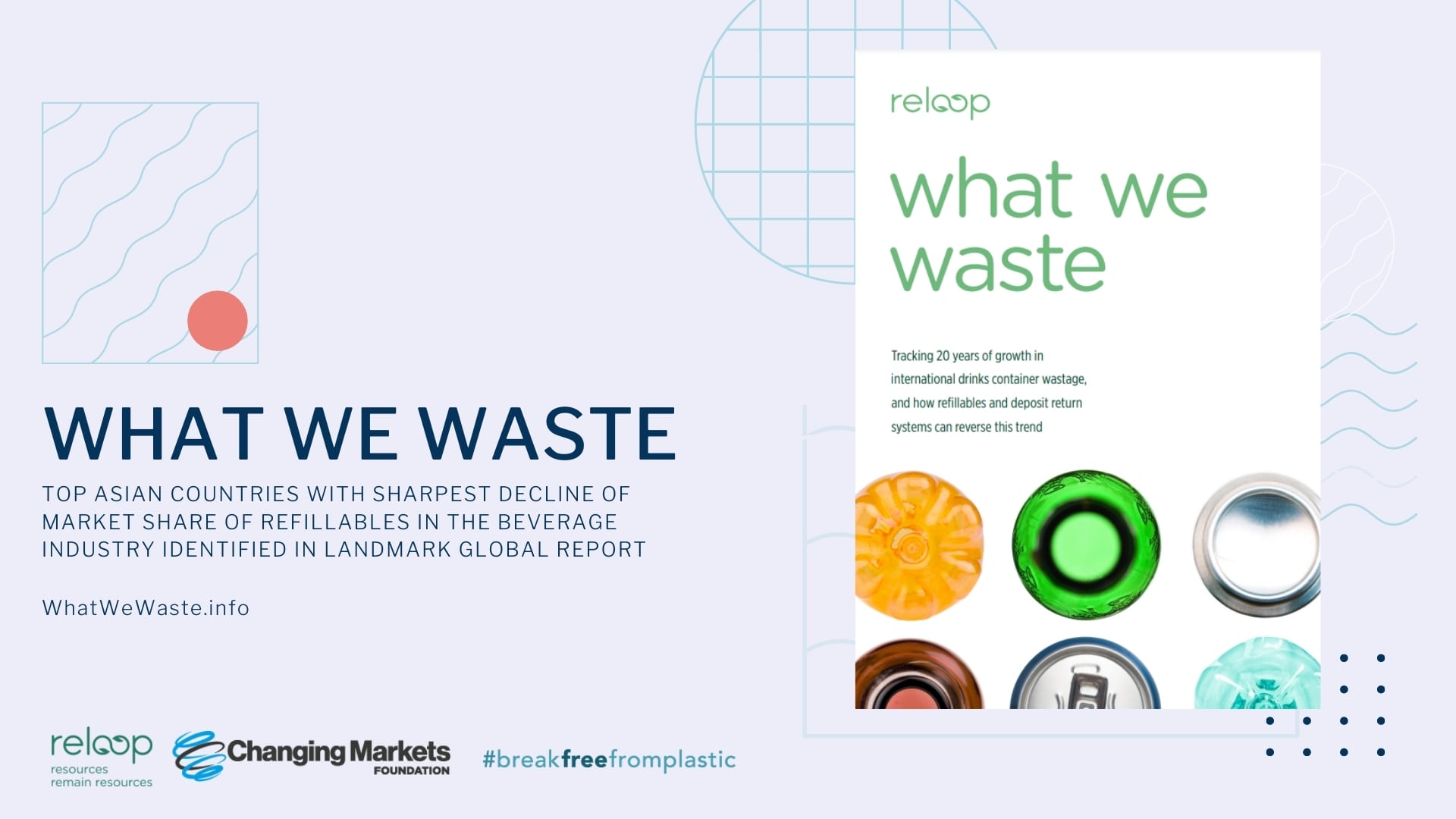MANILA/JAKARTA/BANGKOK/NEW DELHI (April 29, 2021) --- Single-use beverage containers are rapidly displacing refillable systems in many parts of the world and resulting in massive increases in wastage and pollution, according to a new landmark report by international non-profit organisation Reloop[1}, which was released in a media briefing together with Changing Markets and #breakfreefromplastic.
According to the report, What We Waste, beverage container sales have practically doubled between 1999 and 2019 across 93 countries worldwide [2]. Over the same 20-year period, the proportion sold in PET plastic has also more than doubled -- from 17% to 41% - resulting in a corresponding spike in wastage especially in countries which saw an increasing rise in sales of single-use plastics or one-way containers. Furthermore, the data from the report indicates that countries with greater market share for refillables had lower wastage figures.
However, the market share for refillables has consistently shrunk over time, Of the 93 countries cited in the report, the 10 countries with the highest usage of refillables in 2019 have experienced a sharp decline in refillable market share down from 60% to 29% over the last 20 years.
In Asia, the largest contributor to these numbers is China, whose refillable market share dropped from 52% in 1999 to 22% in 2019 despite its stronger than average refillable sector. Other countries in the region like India, Philippines, Indonesia, Thailand and Vietnam have also experienced a sharp decline in refillable market share over the previous 20 years.
What We Waste draws on data from 93 countries to establish the decline in refillable drinks containers over the past 20 years. The report also gives for the first time a comprehensive understanding of the positive impact of deposit return systems (DRS) (4) on reducing drinks container wastage. It outlines how these systems can reduce waste and divert materials from being littered, landfilled, or incinerated. The report also recommends governments to protect and expand the refillable market share in the beverage sector in order to avoid worsening the plastic pollution crisis as well as institutionalize real recycling programs to avoid wastage especially on recyclable materials like metal cans and glass.
The What We Waste Report includes specific information on how refillable and DRS have reduced waste generation (whether plastic, glass, or metal) in some countries. The data, however, can be applied to estimate the effect of changes to refillable market share in a given country, and to see the effect of changing national recycling rates on wastage, especially in countries where no such data is publicly available.
For example, if the entire Southeast Asia region had the same refillable market share as that of the Philippines, (highest in the region), about 15.4 billion plastic bottles could be avoided from ending up in landfills or dumpsites, burned in incinerators, or otherwise polluting the environment.
Clarissa Morawski, CEO and co-founder of Reloop, said: "In most Asian countries, the crucial next step policy-makers should consider will be how to support existing refillable markets, and to consider how to expand them, with the right regulation and incentives. Every single percentage point of market share that switches to refillables across the region will substantially reduce wastage. This same infrastructure can also, in time, be developed into full deposit return systems to capture those remaining non-refillable cans and bottles."
Von Hernandez, Global Coordinator of Break Free from Plastic, said: “The future is not disposable and plastic pollution is not inevitable. In countries like China, India, Vietnam and the Philippines, where there is still a significant market share for refillables, governments must provide the right policy signals not only to protect what’s left of the refillable sector but to expand and bring it back to a position of dominance. Companies that produce ever-increasing amounts of plastic pollution should be held accountable, while systems that avoid plastic waste must be encouraged and strongly supported. This is the kind of direction required to reverse the plastic pollution crisis and avert catastrophic climate change.”
Shania Cheng, Coordinator of Plastic-Free China, said: “As part of the government’s effort to curb wastage from single-use plastics, it should look at instituting deposit return schemes in order to preserve and expand the markets for refillables. Instead of promoting problematic alternatives that result in more wastage, the government can invest more in this type of proven alternative solution.”
Watch the full media launch here
END
CONTACT:
Jed Alegado
Senior Communications Officer for Asia Pacific
jed@breakfreefromplastic.org
+(63) 917 607 0248
Notes:
1. The datasets used include proprietory sales information purchased from GlobalData, which Reloop is unable to publish directly: however, publication of information which combines that data with other datasets, e.g. recycling rates, is permitted. The sales data available covers 93 countries, including all G20 countries and more than 80% of the world's population, although recycling data is only available for a subset of 34 countries, including America, Canada, most of Europe, plus PET-only information for some Asian countries. More information about GlobalData is available here: https://www.globaldata.com
2. Reloop is an international non-profit organisation that brings together industry, government and NGOs into a broad network that seeks to bring about positive change at all levels of resource and waste policy.
https://www.reloopplatform.org/
3. The report is available here: https://www.reloopplatform.org/what-we-waste/
4. Like refillables, deposit return systems rely on consumers paying a small deposit which is refunded in full when the can or bottle is returned. Unlike refillables, these systems collect for recycling rather than reuse, and typically operate at a national or state/provincial level, although many countries in this dataset use the same collection infrastructure for both systems.
5. The first table shows the top 10 Asian countries by total refillables sold (2019).

6. The second table shows the top 10 Asian countries by refillable market share (2019).

About Changing Markets | www.changingmarkets.org | @ChangingMarkets
The Changing Markets Foundation was formed to accelerate and scale-up solutions to sustainability challenges by leveraging the power of markets. Working in partnership with NGOs, other foundations and research organisations we are keen to explore effective solutions to the plastic pollution crisis.
About Break Free From Plastic | www.breakfreefromplastic.org/ | @brkfreefromplastic
The #breakfreefromplastic Movement is a global movement envisioning a future free from plastic pollution. Since its launch in 2016, more than 11,000 organizations and individual supporters from across the world have joined the movement to demand massive reductions in single-use plastics and to push for lasting solutions to the plastic pollution crisis. Break Free From Plastic runs the #WeChooseReuse campaign, calling for a global shift towards refillable and reusable products.
About Reloop | https://www.reloopplatform.org/ | @reloop_platform
Reloop is an international non-profit organisation that brings together industry, government and NGOs into a broad network that seeks to bring about positive change at all levels of resource and waste policy.




